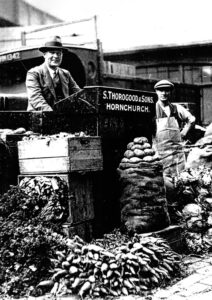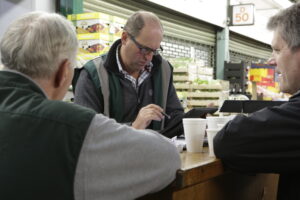New Covent Garden Market is not the only wholesale institution marking 50 years in Nine Elms on November 11th. On the first day the new market opened its doors in Nine Elms, amongst the wholesale traders that became new tenants was S Thorogood & Son. The expanded Thorogood Group is still a major force at NCGM and also the only wholesale business that today has a presence in all three of London’s major fruit and vegetable wholesale markets.
The Thorogood family has been growing and selling high-quality British fresh produce since 1922.
Andrew Thorogood, pictured below, grew up as part of a farming business with 10 partners who were all family members. “We were mostly hand-harvested vegetable farmers, right through the salad range, the brassicas, carrots and potatoes,” says Andrew. "The farms were mainly in Essex, but we had one farm in each of Norfolk and Suffolk.

“We’d had a stand in Borough Market since 1922, which used to take roughly a third of our product. Then in 1974, everyone had the opportunity to move to New Covent Garden Market when it was built. We had a choice between the Growers’ Pavilion or the main hall and we chose the main hall. I was 16 at the time. As soon as we came here, we started to sell a smaller proportion of produce from our own farms and buy more produce from other farmers we knew.”
Through the 1980s and early ‘90s, the Thorogoods operation started to struggle getting hold of decent staff for its farms – this being long before significant numbers of labour made its way over from Eastern Europe. “We had a lot of local families working for us and as they died away, it became very difficult to replace them with people who were good enough to do the job well. So we started to move away from growing salads and vegetables to arable crops,” recalls Andrew.
Split decision
The partnership - S Thorogood & Son – split up in 1996, but the separate partners all retained the name S Thorogood & Son. The wholesale company had become a limited company in 1989 and retained the same directors. Andrew says: “It was such a complex set up we gave the problem to a set of accountants to sort out for us! We let them decide and agreed to accept their decision. It was a leap of faith, but it has never caused a problem since.”
The separate partners were still sending product to the wholesale businesses, although by the time of the turn of the century, most of the produce sold at NCGM was not sourced through the group. It was, however, still mainly grown in Great Britain.
“We purchased a site in New Spitalfields when that opened in 1991 and expanded that in the mid-90s. In 1993, we also bought a lease of a firm that had closed down at Western International,” says Andrew. “It’s progressed pretty well. There are always ups and downs – people are always the main challenge. When I’d just bought Western, I really thought I had the blueprint and I could open in 10 different cities around the country. Then I had a few different issues with staff at a couple of the sites and I could see where it could go wrong. So I reined back and I’ve never ventured outside London.
“I’m pleased I didn’t do it now; it would have stretched me a lot and I was already doing a lot of hours.”
Back to British
Thorogoods has always maintained its focus on homegrown product and Andrew believes that now could be the time to rekindle the relationships with the family farms. “I don’t have anything directly to do with the farms now. They are all still in the family apart from the one in Norfolk, but I think now perhaps we’ll start to see things go back the other way because it’s becoming more difficult to find English produce for the market of the right quality,” he explains. “Most of the product the family farms grow now is wheat barley or oilseed rape, but we still grow potatoes, some of them sold here, and one of the partners grows a lot of asparagus, which we also sell. But we are trying to get them to produce more. They have the land, but it’s not straightforward [to start growing a fresh produce crop]. You’ve got a lot of set up costs, you need machinery you wouldn’t use for anything else, you’ve got to staff it.”
Andrew believes the way forward for wholesalers is to increase the volume of British product available. “We have tried to persuade our existing growers to do more and become part of our system,” he says. “Our suppliers are our business anyway and they are very loyal; we’ve been with most of them for decades. “Most farmers, like me when I was farming, want to do what suits them. They want to do it well, but it needs to suit their year, their seasons, the availability of labour etc.. That doesn’t necessarily suit what we want, so it’s about persuading people to do what we need and sometimes getting financially involved - I think that will become more important in the future too.”
Wholesale strength
The wholesale business continues to perform strongly. “Last year was our best ever across all three sites. Our product offer is a little different from most firms, so maybe we happen to cover the section of the market that people are more attracted to right now. ‘Buy British’ is slightly overdone, but the fact that we specialise in British has definitely helped us in the last three or four years. The growth of farm shops has also helped us – we serve more than 100,” Andrew says.
“Our wholesale business here serves about half and half retail and catering, which is very different to most. At New Spitalfields though, the catering to retail balance is around 30:70 and at Western it’s 20:80, which illustrates the difference between the markets. It’s a nice balance to have.”
Retail in London has obviously changed a great deal, he says. “You do hear terrible things, but it is still doing alright. It’s difficult to tell you why. The shops that are doing well have a broader range of product and are more specialised. They have tended to go slightly more rustic and our product range suits them.”
Catering growth
Over the years, the group has also expanded in different, more organic ways. “We had a bad debt at the NCGM stand and took over the customer’s business in 1991,” says Andrew. “We worked it from the Thorogood stand to begin with, but soon realised that it wasn’t good to be in competition with our customers. So, we set up a separate business called Classic Fresh Foods, which was originally run by Michel du Barbier. It grew gradually, but comfortably; we’ve never tried to take over the world, but it’s consistent.
“I instinctively knew we had to be on the catering side of the business, not because I worried about the wholesale side, it just gave us a better balance,” he says. “Catering businesses have a completely different structure, different margin expectations, different seasonality.
“The two elements of the business can support each other as they don’t always go down or up at the same time. They have always worked very well together - we have never forced the catering side to buy from our wholesale unit as that limits them and they are by and large treated like any other customer. But I’ll always want to know why if they don’t buy from us because they feel they get better value elsewhere.”
The next moves took the group into the world of fungi and bolted on another catering firm. “We wanted to expand both sides of the firm at NCGM, without favouring one or the other, so we took on Mushroom Man in 2021 to extend the balance and range of our wholesale business, having also taken on Rushton’s two years before that to do the same to the catering side," Andrew says. "They were both very well run businesses. I am a bit risk-averse so preferred them to alternative options that may have had bigger opportunities to make more money, but didn’t fit our structure.”
Relocation and rebrand
When the catering business relocated to newly built units at NCGM in 2022, it also underwent a restructure and rebrand. Andrew explains: “We changed the name from Classic to Rushton’s because there was always a problem with there being a Classic Fine Foods and a Classic Fresh Foods. There was never really a crossover with what we did, but half the phone calls were for them and half the cheques we got were for them too. We were first with the name, which was even more annoying.
“Rushton’s had a very good reputation though and was also more specifically recognised for certain things, whereas Classic was a well-run, good value business but maybe didn’t have as much character for people to hang their hat on. We could have continued to run them as two separate businesses out of our new units, but we didn’t want to do that so we rebranded and merged as Rushton’s the chefs' greengrocer on November 1, 2022. The name has since been simplified to Rushton’s, although we’ve left ‘the chefs' greengrocer’ on the vans,” he says.
“We want to push on, so that’s not necessarily the end of our expansion. My son William is gradually taking over more responsibility for the business. He’s based at NCGM, although he works across all of our companies. I spend more time at Spitalfields as it is closer to me and I can deal with everything from there. Barry Westwood and Steve Goldfinch run Thorogoods at Western International – they’ve been there for 30 years and 15 years respectively.
"We still foresee organic growth, but we’ve looked at other businesses too. The whole of the catering trade is going to go through a period of settlement. People’s confidence is pretty low, so we’re seeing most outlets not doing as well as they were. It was always true outside London, but it’s becoming true of London too. The city still looks like it’s absolutely heaving when you go in and at the weekend you can’t get in anywhere, but it’s obvious that some people are missing out in certain parts of the week and that may well continue for a while.”
Andrew’s journey

“When we were in Borough, started by my great grandfather, one of his sons Frank, pictured here on the stand, ran it for a long while. When he died in 1961, my father Jim took over and looked after it for 25 years. He organised the move from Borough to here and for the first few years here, stayed in control. My cousin Chris was also a salesman at Borough and came to NCGM for the first 10 years. He used to go home and work on the farm too and got to a stage when he felt it wasn’t worth carrying on. He thought the whole business should withdraw from wholesale altogether and concentrate on farming. That was when I said I’d like to step in and take it on, as I thought there was a real future in it.

“I took over in 1984, so 40 years ago. “I worked at NCGM for seven or eight years on the wholesale side, then ran Classic Fresh for three or four years. I have a problem with getting sucked into something and find it very hard to break out! You make so many connections in the business you are focusing on that you lose the threads elsewhere and you also hate to go away, as you feel you are letting people down when you’re not there. Classic was good for me as I’d never done much day-to-day buying and it was really interesting being on the other side of the fence for a while.

"Since then it’s been me at the helm until William joined. He left university and went to work in insurance, as an underwriter, until about four years ago he came home one day and said he’d like to be part of the business. We’d spoken about it before, but I didn’t expect it – I had started to get the whole thing ready for sale. He said he wanted to do a season skiing, then go to South Africa for six months, then another season skiing – so ‘see you in two years!’ – that’s exactly what he did. Both my daughters, Katherine and Jo have been involved too at various times.
“I’ve absolutely loved it. I’ve never had a problem getting up in the morning and it is so varied. Not everybody who works here would think that, but I’m lucky that I’m always looking at something different – that’s very exciting.”